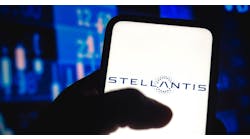General Motors reported it plans to introduce power-generation concepts based on its Hydrotec fuel-cell technology, beyond the transportation sector applications it has already proposed. Hydrotec projects are currently in development to power heavy-duty trucks, commercial aircraft, and locomotives.
Hydrotec technology stores hydrogen in a series of fuel cells, or “power cubes”, which are used to generate an electrical current that powers a motor (or multiple motors.) The system is compact and flexible, with each Hydrotec power cube containing over 300 hydrogen-fuel cells, plus thermal- and power-management systems.
Currently, GM is supplying the Hydrotec system to Nikola Corp., a start-up that aims to produce “zero-emission” heavy-duty (Class 7/8) commercial vehicles, while other applications are in development with Liebherr Aerospace and Wabtec.
GM’s new Hydrotec proposals include a Mobile Power Generator (MPG) to provide fast-charge capability for EVs without installing permanent charge points; a rapid-charger unit called “Empower” that would allow retail fuel stations to add DC fast-charging capability, with expanding the grid; and a palletized MPG to power military camps and installations.
These fuel-cell generators could replace gas- and diesel-burning generators at worksites, buildings, and other locations, with fewer emissions GM emphasized, or they could back-up or temporarily replace grid-sourced electricity for residential and small commercial enterprises during power disruptions.
“Our vision of an all-electric future is broader than just passenger vehicles or even transportation," stated Charlie Freese, GM executive director of the global Hydrotec business. “Our energy platform expertise with Ultium vehicle architectures and propulsion components and Hydrotec fuel cells can expand access to energy across many different industries and users, while helping to reduce emissions often associated with power generation.”






